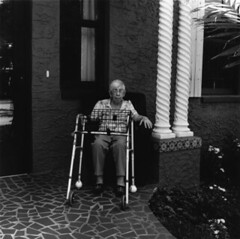I read something recently about a trend in nursing home care that concerned me. Many facilities are cutting staff in the wake of declining admissions as state and federal governments cut funding to Medicare and Medicaid programs and more senior citizens and disabled people turn to alternative sources like adult day care and outpatient rehabilitation services.
I understand that like any business nursing homes need to be profitable if they want to stay in business. But staff cuts can affect the care residents receive because the remaining staff have more residents to take care of during their shift. That could lead to even more employee turnover, or even worse, frustrated employees who adopt undesirable solutions for handling routine needs.
For example when my mom was in a nursing home recovering from an accident she was capable of going to the bathroom with help. But often there were no nurses available to help her. So the staff chose to put my mother in an adult diaper. It was a humiliating experience and an unacceptable solution, especially because my mom wasn’t bedridden.
When I learned what was going on I insisted that my mother be taken to the bathroom, and my brother or sister-in-law visited daily to make sure her needs were being addressed. I know many nursing home residents don’t have family members who are able to visit regularly so it makes we wonder what happens to residents who can’t communicate their needs or has on one around to advocate for them.
If you are considering putting your loved one in a nursing home or already have one in a nursing home, in addition to asking about the services and activities offered you should ask about the patient to staff ratio. In other words, how many patients will one staff person be responsible for on their shift and if the patients all have similar needs. While your at it, ask the likelihood that the patient to staff ratio will change for the worse and check the nursing home’s state inspections records. Each nursing home facility is assigned a quality of life or quality of care deficiencies rating. The rating is based on the prior two week period before a state inspection and the data comes from the nursing home so there is no guarantee that things have not changed.
During your visits pay attention to how clean the rooms and common areas look as well as the overall appearance of the residents. Are their clothes clean? Do they appear hungry or dehydrated? Are staff members responding to their calls for assistance? Once while visiting a friend’s mother, I had to remind the staff that they had not served her dinner.
I’m not saying that a nursing home isn’t the right solution for your loved one. But you should keep informed about the changes that affect the industry because those changes will affect the quality of care your loved one receives for better or worse.
You might also like:
Adult day care can help care for your parents
Related articles
- Tennessee Bristol Nursing Home Faces Daily Fines, Admissions Halted (chicagonursinghomelawyerblawg.com)



You couldn’t be more accurate. One of the common things I find in nursing home abuse and wrongful death cases is a failure in staff. Often, staff is overextended leading to mistakes, false charting, poor care and neglect. You’re absolutely right, a nursing home is a business and these businesses are run on a for profit basis. It’s important to understand that there is a limited amount of revenue a nursing home can collect on a daily basis. So if a nursing home wants to increase their bottom line, they need to cut out the expenses in between. It’s unfortunate that the most common place for expenses to be cut is in the staffing levels. I actually recently posted a video on YouTube about this exact topic.
http://www.youtube.com/watch?v=iExP6QpE2-s
Cuts in staff lead to exactly what you are talking about in your second paragraph.
Great article, great advice. Thank you.
If someone feel that your family member needs true assistance, it may be in their best interest and the best interests loved one to find home care services. In many cases seniors do not want to have help. They feel that no matter how old they are or what their illness may be, they can handle themselves because they are, plain and simple, old enough to care for themselves.